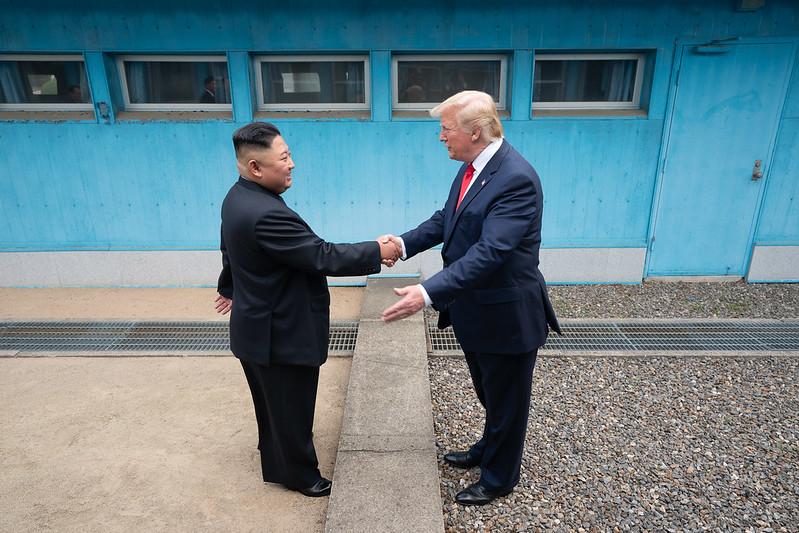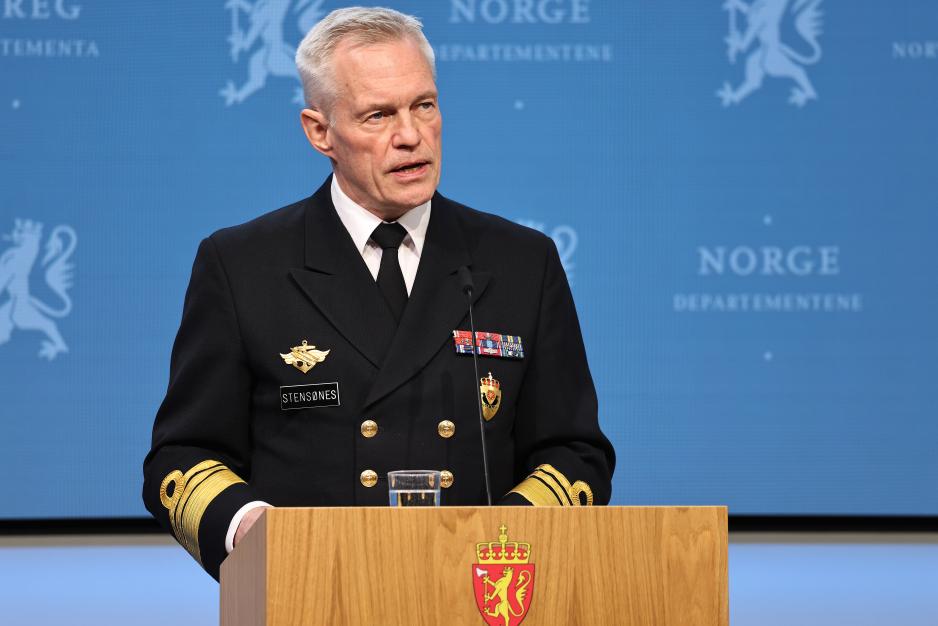The US Presidential Election: Defense Professor: "We Should Be Worried About Russia if Trump Wins the Election"
Håkon Lunde Saxi is a Norwegian political scientist, historian, researcher, and professor at the Norwegian Defence University. He now warns against the consequences of Donald Trump in the White House. (Photo: Trine Jonassen)
Bodø (High North News): "We should be worried about Russia if Trump wins the US presidential election," says Professor Håkon Lunde Saxi at the Norwegian Defence University about what he calls a nightmare scenario. "In Trump's next term, no adults will be present."
During an electoral meeting in February, Donald Trump announced that he would no longer defend NATO allies if Russia attacks them if they have not "paid the bill." The Republican ex-president also said that Vladimir Putin and Kreml could "do whatever the hell they want" to countries that do not pay enough in the alliance.
Were these the usual empty threats we have become accustomed to hearing from that side, or is there actually something behind Trump's statements this time?
Professor Håkon Lunde Saxi at the Norwegian Defence University and the Norwegian Defence Command and Staff College is clear:
The significance of a new term of Donald Trump in the White House cannot be underestimated.
In fact, the defense professor fears that Trump's threats could lead to an unanswered attack against a NATO country.
No longer any adults present
No adults present
"There would be 'no adults present' in a new Trump term," says Saxi.
He explains that Trump brought with him what were considered foreign and security policy traditionalists in his first term, which ensured the continuation of traditional American policies.
"These, such as James Matti, were those who moderated the president and acted as one of the so-called "adults in the room," says Saxi.
Mattis was the US MoD in Donald Trump's government from 2017 to 2018. He has since denounced Trump and described him as a threat to the US Constitution in 2020.
"Although Trump said many strange things as president, the American policy was largely as it always had been in practical terms."

Great friends: North Korea's dictator, Kim Jong Un, and the previous president of the US, Donald Trump. (Archive photo: the White House)
Can do what he wants
Saxi believes this would not be the case in the next round if Trump wins the US presidential election on November 5th. The people around him have learned.
"They have no intention of letting this happen again. Therefore, there will be "no adults present" in the event of a new term. There will not be any moderating forces essentially working against Trump within his own administration," says the defense professor.
Thus, Trump will be freer to do as he pleases.
"In theory, he could declare that the US will not come to aid a NATO country if they are attacked. That they can thank themselves for being in such a crisis, and perhaps that they have not spent enough on defense in the past 20 years. Thus, the US does not consider itself obligated to help," says Saxi.
No withdrawal
If Trump turns his back on a NATO country in need, it will still not be a formal withdrawal from NATO. The US Congress made sure of that after what they called "Trump's attack on NATO" during his last period in the White House.
Also read (The article continues)
In the winter of 2023, it was decided that Congress must approve a possible withdrawal from the defense alliance. The decision is part of the US defense strategy that came out last year, which states that the president "shall not suspend, terminate, denounce or withdraw the United States from the North Atlantic Treaty" without a majority vote in the Senate or a law passed by the entire Congress.
"However, that does not have much practical significance since the US president orders the American forces to war. So if Trump says he will not send American women and men to defend, say, Norway, the deterrent effect of a US NATO membership and the hard security guarantee that Norway has will largely be gone," warns Saxi, painting a gloomy image of the future.
The Nordics must stick together
The US accounts for 70 percent of NATO's defense budget, while the remaining 31 account for a third. If Trump withdraws support, NATO would be significantly weakened.
"If that happens, Europe will truly need a tight defense and security policy cooperation in the remaining NATO. And not least in the Nordic region. Thus, it is even more critical that the Nordics stick together and that we have good ties with our most important European allies, the UK, France, and Germany.
France and the UK are particularly important as they have nuclear weapons, believes Saxi.
The other 31 allies, apart from the US, will individually be obliged to help each other
All countries bordering Russia – Norway, Finland, Estonia, Latvia, Lithuania, and Poland – meet NATO's requirement of spending two percent of the country's gross national product (GNP) on defense by 2024.
Could stop Article 5
NATO's Article 5 – the most famous of NATO's 14 articles – establishes mutual aid in the event of an attack on one of the parties in the treaty, i.e., the principle "one for all, all for one":
“The Parties agree that an armed attack against one or more of them in Europe or North America shall be considered an attack against them all."
So what happens if one of the countries turns its back on it?
Could the US hinder Article 5 from being triggered for the Nordic and Europe's NATO members?
"Yes, they could, as they are a consensus organization. However, Article 5 applies both individually and collectively. So the other 31 allies would be individually obligated to help each other," says Håkon Lunde Saxi.
Kreml believes that NATO is already in direct confrontation with Russia after an interview with NATO's Secretary General Jens Stoltenberg in The Economist, in which he said that Ukraine should be allowed to use NATO weapons against Russian targets. (Archive photo: Trine Jonassen)
Article 5 refers to Article 51 in the UN Charter about the right to individual and collective self-defense. The article has been invoked only once in history in connection with the terror attack against the US on September 11th, 2001.
And there is no doubt that the Nordic defense is significantly strengthened with Sweden, Norway, and Finland in NATO.
Hard security guarantee
In the Swedish report delivered to the Swedish parliament in connection with Sweden's NATO application, one argument is that membership will reduce Sweden's dependence on the US precisely because they will also have a hard security guarantee from NATO's other member countries.
Thus, Sweden will not be as dependent on the bilateral relationship with the US.
That does not change the fact that the US remains NATO's leading member.
Also read (The article continues)
Massive militarization
So now NATO is preparing for a possible war with Russia. Is Russia preparing for a war against NATO?
"Russia is now investing almost ten percent of its GNP in defense. Forty percent of the Russian state budget goes toward defense. They are making an enormous militarization of Russian society. In comparison, Norway now spends exactly two percent of the GNP on defense," comments Saxi, explaining that Russia is making an enormous investment in defense right now.
"Right now, Russia's military forces, their land and air defense, are bound up in the war in Ukraine. But the war could stop somehow, hopefully without Ukraine ceasing to be an independent state. In that case, we should absolutely be worried about what Russia will do with its military ability."
Unprepared
According to the professor, European countries' defenses are unprepared for war in many areas. For example, Germany has ammunition for just a few days in a war situation.
"So that the NATO countries are unprepared for war is quite obvious. It takes many years to strengthen that ability."
This is the nightmare scenario.
Norwegian armories are also small and have significant deficiencies. The Norwegian Defense Commission's report states that Norway must purchase ammunition worth about NOK 30 to 50 million to meet the set operative requirements.
"The sums are astronomical. But Russia has for almost three years waged a war that has given them war experience and increased production of ammunition," Saxi reminds us.
Nightmare scenario
He believes it will be tempting to a Russian president – armed to the teeth at the end of the Ukraine war – to use this war power against a NATO country. Perhaps particularly against a Baltic country that an American president has already announced he will not help if it is attacked.
"This is the nightmare scenario," says Saxi.
"A militarily strong Russia that perhaps has won the war in Ukraine, with an American president who will not come to NATO's aid, and a Europe who has not managed to get its defense back on its feet after the peacetime.
"So we have a situation in the next years that could be quite dangerous before the European NATO countries' defense are built up," he warns.
New alliances
There is reason to worry?
"Yes, we should be worried about some type of situation regarding Russia in the next couple of years," confirms Håkon Lunde Saxi.
With the unrest shaking the world, the West's stability depends on a solid community in NATO. Authoritarian states such as China, Russia, North Korea, and Iran are finding each other in new collaborations and alliances, and Iran and North Korea are now supporting Russia with military equipment.
Saxi believes these new alliances must be watched because they have overlapping interests that challenge NATO's allies. NATO cannot afford any shortcomings in the defense system.
"We must hope that the unity in NATO lasts. If NATO stands collected, our ability to deter possible opponents should be evident because NATO's collective ability is so much greater than Russia's. Russia cannot win a long-term conventional war against the entire NATO alliance if it stands united," says the defense professor.
Also read (The article continues)
Crucial unity
However, much of the deterrent effect disappears if Russia does not see NATO as a politically united power.
"If Russia believes they can act against a Baltic country without NATO reacting collectively, Russia can benefit from doing just that. So, the political unity in NATO is crucial. That is why the US election in November is so important."
"We must hope that the right person wins, but it does not look good at the moment," says Saxi.
Hybrid threats
Has Russia managed to destabilize NATO from within?
"Yes, absolutely. They are constantly running various hybrid actions to undermine the political unity in the NATO alliance and within the countries."

Chief of the Norwegian Intelligence Service, Vice Admiral Nils Andreas Stensønes, during the presentation of the Norwegian national threat assessment of 2024. According to the Intelligence Service's report, Fokus 2024, the public debate is particularly vulnerable to Russian influential activity in these areas: defense and security policy, Arctic and Svalbard policy, energy and environmental policy, and not least, the West's and Norway's approach to the war in Ukraine. (Photo: Torbjørn Kjosvold/the Norwegian Armed Forces)
Is this what we are seeing the results of in the US now?
"It is difficult to say how significant the operations have been. Russia is clearly trying to create discord through troll factories to reinforce the inner political opposites in the US. Whether the strong conflicting powers are a product of Russia's strategies, we cannot know.
Finland is best armed
Finland is the Nordic country best armed for war. The new NATO country has a more expansive total defense than Norway, which never scaled down after the Cold War.
"Norway hardly has an emergency stockpile, such as grain storage," says Saxi.
The government decided to change that last year after 20 years without grain storage. The aim is to have grains for three months of consumption by 2029.
The political unity in NATO is crucial.
"In Finland, they have not only grain storage but also strategic resources to keep the industry running. We have a few things to learn from Finland, things we once knew but that have been abolished because of the peace in the 2000s," says Saxi.
Prestockage
However, Finland is dependent on supplies from across the sea. Recently, the Financial Times wrote that the Finnish defense had started prestocking equipment in Norway and will do the same in Sweden.
"A coordination of the total defense between Norway, Sweden, and Finland, I think, is quite clear. A coordination of both the total defense and the military, in which they coordinate logistics and support of the civilian society in crises and war."
"It will be quite necessary, particularly for Finland, which is so exposed by sea and dependent on land supplies via Norway," says Saxi.
Three years
The defense of the Cap of the North will become easier as all the Nordic countries are members of NATO, but Norway will spend 12 years reaching the targets set in the long-term defense plan.
NORDEFCO
NORDEFCO is a Nordic defense cooperation between Norway, Sweden, Finland, Iceland and Denmark. The cooperation was established through a memorandum of understanding between the five Nordic countries and signed on November 5th, 2009.
NOREDEFCO is a merger of three previous cooperation agreements; NORDSUP, NORDAC, and NORDCAPS.
Source: Wikipedia
If the Ukraine war ends tomorrow, how long does Russia need to rebuild its military ability anew?
"Poland says three years. So a possible attack on NATO could come in three years. Others say ten years, such as Germany. But Norway has also started to adjust down the time Russia needs to rebuild its defense," says Saxi.
A demanding exercise
Yet, the Nordic region is clearly better equipped to defend itself with Finland and Sweden in NATO.
This could be necessary, even with the entire Nordic region in NATO. For NATO's Article 5 to be triggered, all 32 countries must agree that it is, in fact, an attack.
"It could be a demanding exercise because the opponent will make sure to create confusion and ambiguity around the incident. Hungary's PM Viktor Orbán or Turkey's President Recep Erdoğan could then decide that the situation is too ambiguous and not support Article 5, for example," explains Saxi.
However, the Nordics' own alliances will still exist. This is both because all NATO countries are individually obligated to help and because of the Nordic defense cooperation NORDEFCO.
"NATO is too big and complicated, so we need a regional club such as this," concludes Saxi.
With or without the US.





